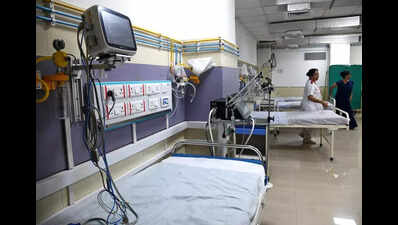Pune: When 50-year-old Anil* visited multiple doctors with complaints of blood in his stool, the specialists diagnosed him with piles, prescribed medication and even carried out surgery. Yet, strangely, the blood appeared again. It was only after a colonoscopy that the real culprit revealed itself: Anil had colon cancer.
You Can Also Check: Pune AQI | Weather in Pune | Bank Holidays in Pune | Public Holidays in Pune Sadly, this scenario is not uncommon, doctors said. Every month, they see a number of cases in which a missed or delayed diagnosis of colon cancer has led to worsened outcomes. "The message is clear: If there is bleeding, look up (colon) before you look down (to the anal region)," said Deenanath Mangeshkar hospital's senior gastroenterologist and GI endoscopist Dr Amol Bapaye.

Piles and fissures can coexist with colon cancer. Individuals with persistent rectal bleeding should undergo colonoscopy without fail, experts stressed. While colon cancer screening , or colonoscopy, has been the norm for years in the West, India has lagged despite a worrying increase in incidence.
Statistics over the last 10–20 years indicate a sharp rise in colon, pancreatic, gastric and esophageal cancers in the country. "When I did my postgraduate thesis on colorectal cancer in 1991–92, I struggled to find 50 cases. Today, we see 40–50 cases every month with polyps or colon cancer," Dr Bapaye said.
Colon cancer has a well-defined progression in patients. It starts with the formation of polyps — small growths in the colon that take about 7–10 years to turn cancerous. If detected early, polyps removal can stop this progression entirely, doctors said.
"This is why screening colonoscopy has been a standard recommendation for people over 50 years of age in Western countries. Recently, the American Society of Gastrointestinal Endoscopy even lowered this recommended screening age to 45," Dr Bapaye said. One of the main reasons routine screening colonoscopy is not widely recommended in India is the relatively lower prevalence of polyps compared to the West.
But that trend is changing. "The 10-year average annual polyp detection rate in India is now 5.5% higher than Korea's 3.
7%. Yet, from a population screening perspective, only about 4% of Indians develop polyps, making universal colonoscopy screening impractical," Dr Bapaye said. Also, Indians were largely seen as protected from colon cancer due to a high-fibre vegetarian diet.
"But with increasing consumption of fast food and processed meat, the risk has escalated," said Dr Rajesh Puri, director of endoscopy, Medanta Medicity, Gurgaon and former honorary secretary of the Society of Gastrointestinal Endoscopists of India (SGEI). Experts are working on non-invasive screening methods and AI-based symptom analysis to predict the probability of colon cancer. "But these methods need to be fully validated.
Until then, awareness remains the most powerful tool," said Dr Bapaye. Experts said certain high-risk groups must undergo colonoscopy without fail. "This includes individuals with a family history of colon cancer or colonic polyps, women with a history of breast, endometrial, or ovarian cancer, patients with unexplained blood in stool and those experiencing recent changes in bowel habits, such as persistent constipation, mucus-laden stools, or incomplete bowel movement," said Dr Nilay Mehta, senior gastroenterologist and endoscopist at Zydus Hospital, Ahmedabad, and SGEI's honorary president.
Routine sonography cannot detect colon cancer, as it cannot visualise the colon's interior. Stool tests, though available, have a detection accuracy of only about 50%, meaning that half of all colon cancer cases may be missed, experts warned. Colon cancer is highly curable if detected at the polyp stage.
However, once a person has polyps, they are at an increased risk of developing colon cancer in the future. Regular follow-ups and timely colonoscopies are essential. "Polyps may not be cancer today, but they can become cancer tomorrow.
That's why screening matters," Dr Bapaye said..
Health

Blood in stool? It won’t always be piles, doctors warn as they recommend colonoscopy screenings
















